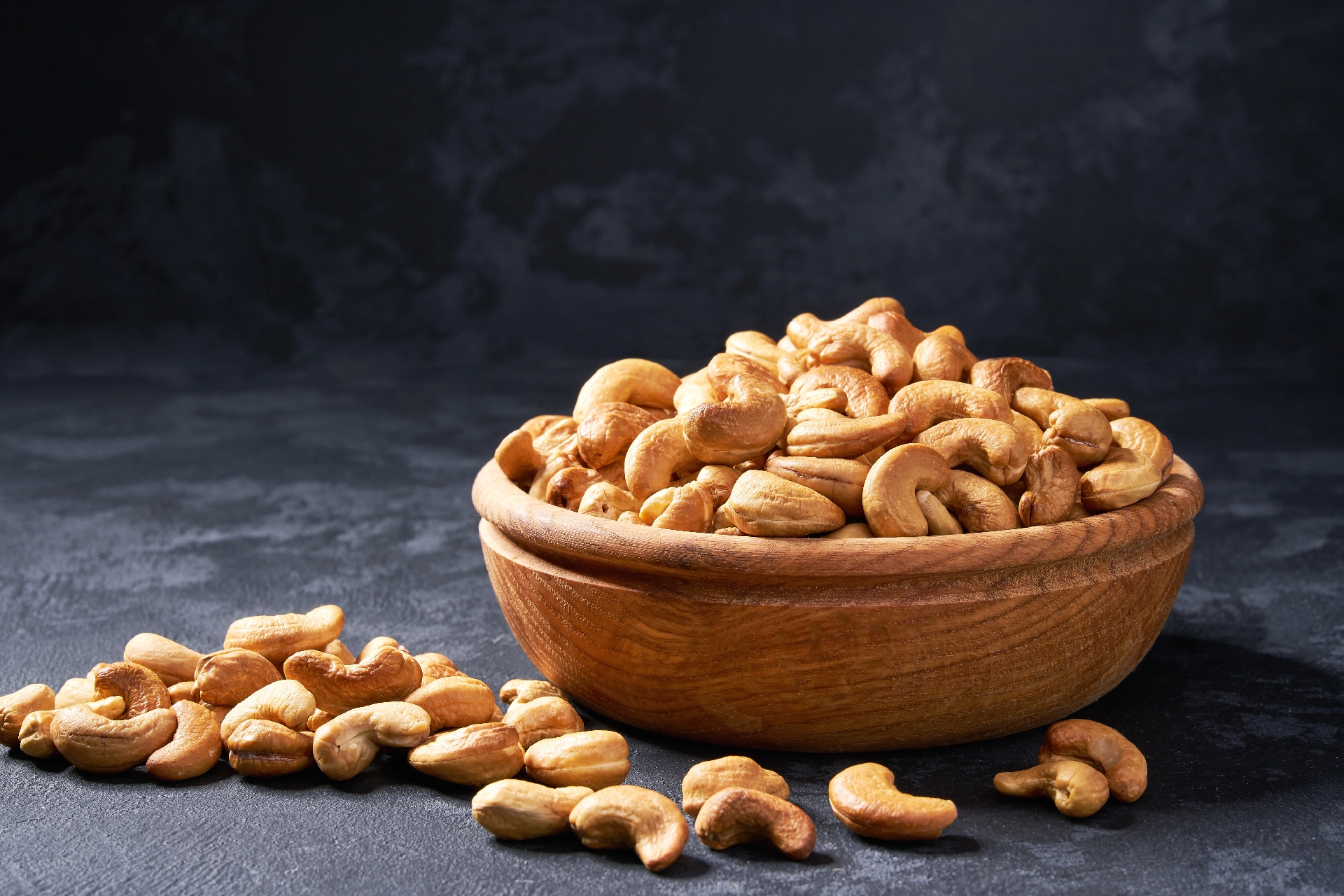General Physician | 7 min read
5 Benefits of Peanut Oil and its Side Effects!
Medically reviewed by
Table of Content
Key Takeaways
- Peanut oil contains fatty acids, vitamins, minerals, and compounds
- Peanut oil benefits your hair, skin, heart, brain, bones, and immunity
- Consuming peanut oil can lower LDL level and control your cholesterol
Peanut oil is one of the healthiest oils commonly used in cooking. It is mainly used for frying foods. The oil is also referred to as arachis or groundnut oil. This edible oil derived from peanut seeds is commonly used in Asian cultures [1]. Peanut oil is available in various varieties including refined, unrefined, gourmet, and cold-pressed. Each of these varieties has slight differences in their nutritional value and health benefits.
The various peanut oil benefits are linked with its diverse types of fatty acids, vitamins, minerals, and organic compounds. The oil has a safe balance of fatty acids that helps boost your health in many ways. Read more about the benefits and side effects of peanut oil.
Additional Read: 5 Amazing Tea Tree Oil Benefits You Should Keep in Mind!Nutrient Composition
Peanuts contain:
- 119 Calories
- 14 grams of fats
- 2.3% grams of saturated fat
- 6.2% grams of monosaturated fat
- 4.3 grams of polyunsaturated fat
- 11% Vitamin E
- Phytosterols
The main source of monosaturated fatty acids is omega-3 or oleic acids. However, it contains linoleic acid, an omega-6 fatty acid, which may be harmful in high concentrations as it tends to cause inflammation.
Peanut Oil Benefits and Uses
Peanut oil for Brain
Peanut oil contains many healthy fats that help improve cognitive functions and protect from cognitive decline due to age. Moreover, it also contains other nutrients to improve blood flow to the brain and moods. Peanuts also help you be more alert.
Peanuts for Blood pressure
Eating peanuts will take care of your magnesium needs; some studies have shown magnesium can lower blood pressure. So consuming peanuts may help regulate your blood pressure. Moreover, peanuts are rich in fibre, which decreases blood pressure levels.
Peanuts for gut
You can consume peanuts to improve digestion. It promotes the growth of helpful gut bacteria for properly breaking down food. This may be due to its high fibre content. Foods with high fibre content increase gut bacteria.
Peanuts for reducing inflammation
Inflammation occurs when the body is trying to fight infection. But prolonged inflammation may cause cancer, arthritis, asthma, heart disease, etc. The healthy fats in peanuts can help the body fight inflammation.
Peanuts for Weight loss
Several observational studies suggest that despite having fats, peanuts do not contribute to weight gain, and the protein in peanuts helps you achieve satiety. Therefore, peanuts can help in weight loss by curbing hunger without weight gain.
Peanuts for preventing Gallstones
Studies have observed that peanuts reduce the probability of gallstones. The cause may be the cholesterol-lowering property of peanuts, as Gallstones mostly consist of Cholesterol.
Peanut oil benefits for bones
Peanut oil can reduce the pain of arthritis, a condition caused by inflammation of the bones. With it, you can also heal the inflammation associated with joint disease. A peanut oil massage can energize your body and provide relief from joint and muscle aches. The oil is also rich in a protein that helps boost your bones and muscles. It is also a great source of vitamin E that is good for your overall health.

Peanut oil benefits for hair
For better health of your hair, it is better to avoid chemicals and use peanut oil instead. This way you can protect your hair from the loss of protein. Applying the oil adds moisture, regenerates your damaged hair, and thickens your strands. The vitamin E in peanut oil can reduce effects of hair damage, fight dandruff, and strengthen your hair follicles.
Peanut oil benefits for skin
Peanut oil is used in many skincare products. The antibacterial properties of this oil can boost your skin health. The oil can treat acne by fighting the inflammation that causes it. Apply a few drops of peanut oil mixed with 2-3 drops of lime to the affected area. This can not only benefit dry skin but also prevent blackheads. The vitamin and anti-aging properties of peanut oil helps to reduce dark spots, wrinkles, patchy skin, and other signs of aging.
Peanut oil for heart
Peanut oil has fatty acids that make it high in calories. The mono-unsaturated fatty acids (MUFAs) present in this oil can increase your HDL levels (good cholesterol) and lower LDL levels (bad cholesterol). A high level of LDL can indicate the risk of heart disease [3]. So, by lowering it, peanut oil can reduce the risk of heart attacks and coronary artery disease. Apart from having a diet of low cholesterol food, add a moderate amount of peanut oil to your meals. This can help you maintain your cholesterol levels and also keeps your heart happy!
Peanut oil for diabetes
Peanut oil has a high content of mono-unsaturated and poly-unsaturated fats. This is why it is recommended for diabetics as unsaturated fats can lower blood glucose levels and help you maintain it. A review reported that replacing saturated fats with polyunsaturated fats reduces blood sugar levels and HbA1c [4].

Peanut Oil Side Effects and Risks
- Peanuts may cause allergies; these may vary but include skin rashes, gastrointestinal reactions, respiratory tract reactions, and anaphylaxis. The reactions may include diarrhoea, stomach cramps, tingling in the throat, etc.
- Peanuts may also contain harmful fungi. Aspergillus flavus may contaminate the peanuts, causing food poisoning. Therefore, it would not be a good idea to eat raw peanuts
- Peanut oil contains a large amount of omega-6 fatty acids. Although this is good for your overall health and body, too much of it can have a downside. While a moderate amount can reduce inflammation, consuming a high amount of omega-6 can have a reverse effect and raise cardiovascular inflammation. If your diet already contains enough omega-6 fatty acids, it is best to cut down on peanut oil. Remember to consume all fatty acids in moderation.
- Although there are many benefits of peanut oil, do consume this vitamin E-rich food in moderation [2]. Going overboard with peanut oil can lead to weight gain. Also note that polyunsaturated fats in peanut oil are prone to oxidation, which may lead to the formation of free radicals and other harmful compounds. To be on the safer side, you can switch to more stable oils. Therefore, it is better to consult a dietician before you finalize your diet plan. Book an online doctor consultation with the best dieticians on Bajaj Finserv Health. This way, you can get the right advice to keep yourself healthy.
FAQ
Is peanut oil good for health?
Peanuts are good for health as they contain various nutrients and minerals, including Vitamin E and Omega-3. Its benefits include preventing cognitive decline due to age, regulating blood pressure, and preventing heart diseases. Peanuts may also reduce the risk of diabetes and gallstones.
What are the side effects of peanut oil?
Peanut oil is healthy but beware of the side effects, including allergies. You may have peanut allergies, so consult a doctor if you see any rashes or reactions to the upper respiratory tract or gastrointestinal reactions. Moreover, overconsumption of peanuts can cause oxidation, causing the formation of harmful free radicals. Peanuts contain omega-6 fatty acids that may cause inflammation if consumed excessively.
Is peanut oil healthy for frying?
Peanut oil is healthy for frying in low heat. However, do not deep fry; use peanut oils containing polyunsaturated fatty acids. These fatty acids degrade under high heat, converting to harmful substances.
Is peanut oil healthier than olive oil?
Because of the high omega-6 fatty acid content, peanut oil is not suitable for regular cooking. Therefore, olive oil is healthier than peanut oil for regular use.
Is groundnut oil good for BP patients?
Groundnut oil contains magnesium. Several studies suggest that magnesium reduces blood pressure; therefore, groundnut can benefit BP patients.
References
- https://www.organicfacts.net/health-benefits/oils/peanut-oil.html
- https://www.ncbi.nlm.nih.gov/pmc/articles/PMC4711439/
- https://my.clevelandclinic.org/health/articles/16866-cholesterol-guidelines--heart-health#:~:text=The%20fact%20is%2C%20elevated%20low,chest%20pain%20and%20heart%20attack.
- https://journals.plos.org/plosmedicine/article?id=10.1371/journal.pmed.1002087
Disclaimer
Please note that this article is solely meant for informational purposes and Bajaj Finserv Health Limited (“BFHL”) does not shoulder any responsibility of the views/advice/information expressed/given by the writer/reviewer/originator. This article should not be considered as a substitute for any medical advice, diagnosis or treatment. Always consult with your trusted physician/qualified healthcare professional to evaluate your medical condition. The above article has been reviewed by a qualified doctor and BFHL is not responsible for any damages for any information or services provided by any third party.





